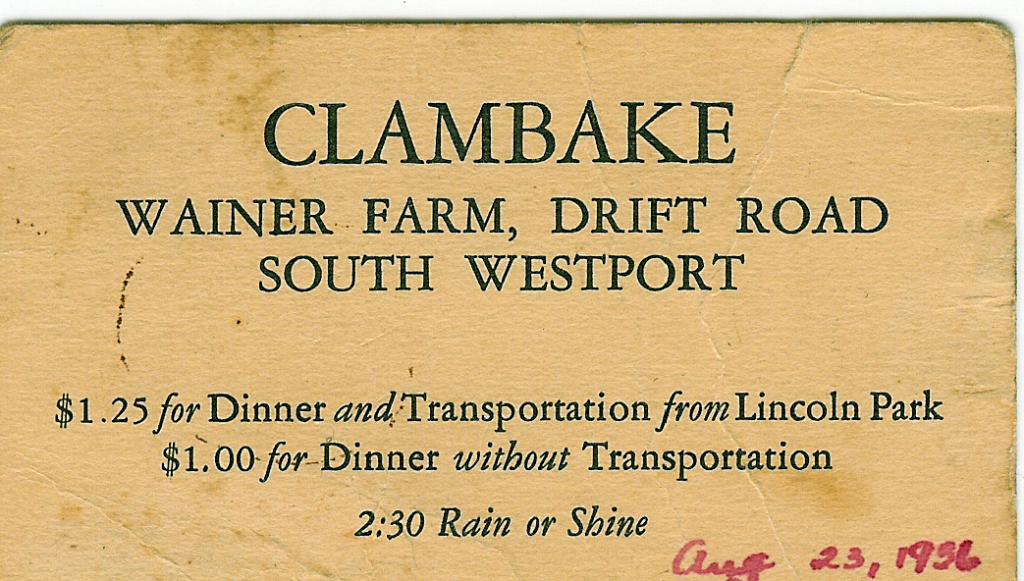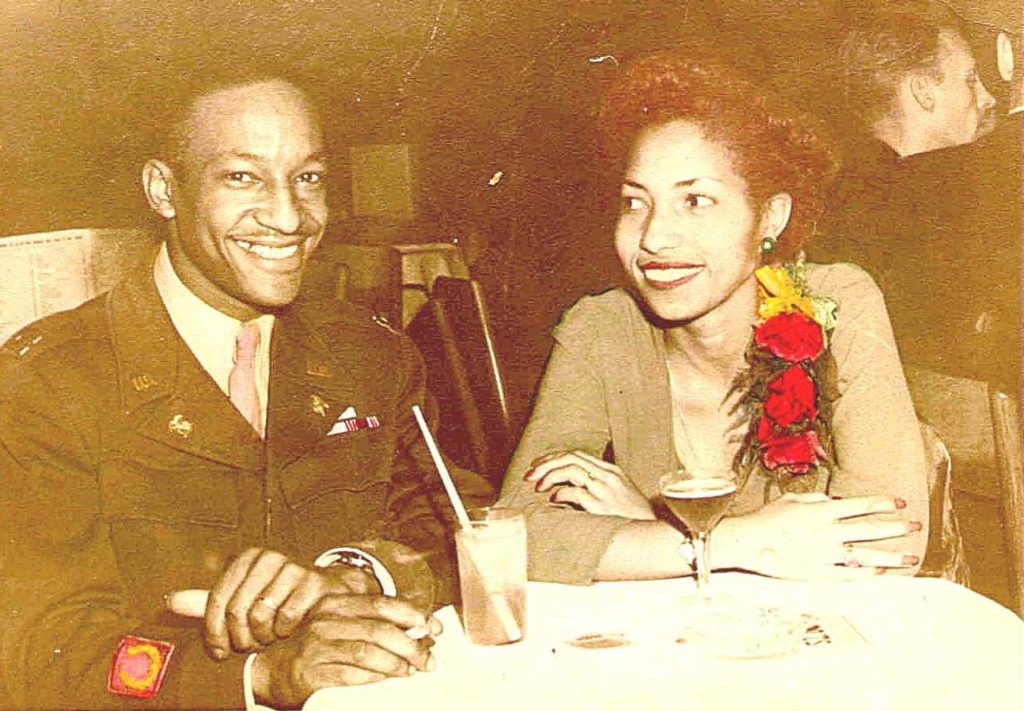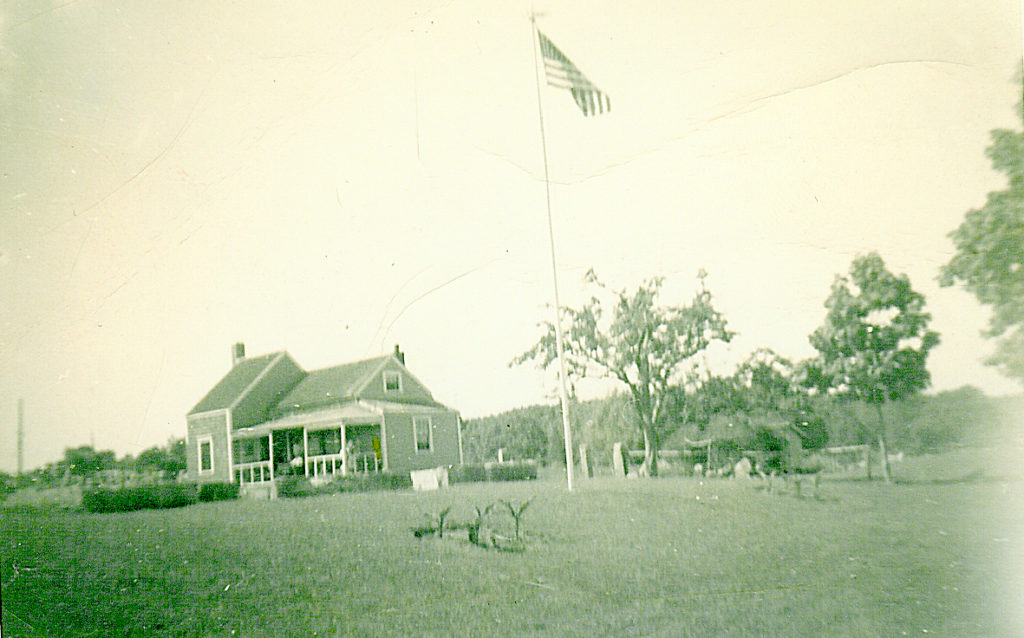The Country, Memories of the Wainer Farm on Drift Road by George H. Wortham Jr.
Posted on February 9, 2021 by Jenny ONeill
The Importance of the “The Country”
Blueberries
The Animals
Driving
Mom, the Great Organizer
Baseball
The Gardens
Springtime
The Elders
Up on the Hill
GaGa’s Medicine
The Radio
Monday’s
The Flag
The Wainer Stories
The Farmhouses
The Graves
The Stone
The Well
The Ancestors
About the Author
The Farm was known as the Wainer Farm by visitors, but by close friends and family it was known as “The Country.” It was the center of all family activity and special events. You had a better chance of seeing the family by going to Westport than to New Bedford.
1.The Importance of “The Country”
I was born in New Bedford on Thanksgiving Day, November 27, 1947. I was taken for the first time outside to stay all day on March 20. I was taken to the country to see GaGa on March 22.
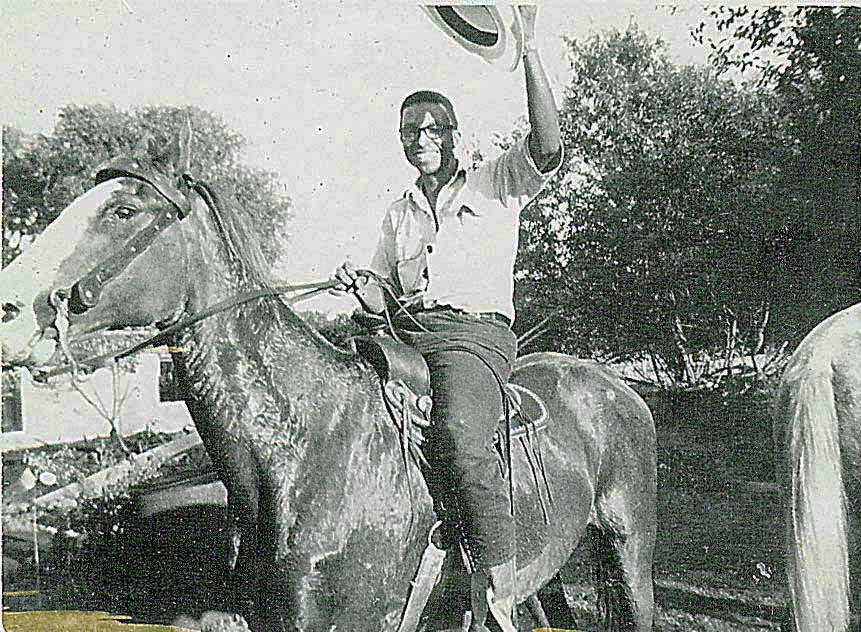
George H. Wortham Jr. (the author) on Red
My goal has been to record as much of the family history as I can, from the written documents and from the oral tradition that I was fortunate to get firsthand and hand it down to the next generation. I hope that someday when we all get together, my grandfather, Michael Quaben and my uncle, Paul Cuffe will invite me to sit with them for a while and introduce me to the rest of the family and thank me for keeping their names in front of the family so that others in the family would know who they were.
Discipline
The philosophy of the Wainer-Gonsalves family was “to spare the rod you spoiled the child.” We heard this statement all the time and it was held to. When Carol, my wife, and I were in Phoenix, AZ during a sales meeting a couple of years ago we took a tour of the area. Our guide started to tell the group about the customs of the Navajo. He said the Grandparents raised the children while the parent provided for the household. An uncle would administer the spankings and not the parents because this separated the confusion of the loving relationship from the necessary need for punishment. As he talked I saw no difference in the way I was raised in The Country. The only difference I saw was that any adult would administer the spankings when necessary in the Wainer family. If you were doing something wrong and an adult disciplined you, you hoped it stopped there and did not get back to Momma or Nanna because you got another spanking when you got home. The one thing that I never heard growing up was “wait until your father comes home”. Discipline was done then and there. The women spanked us but ToiToi had us work on the rock pile. The farm grew stones and we would pick them up in pails and carry them to a pile so that they could later be put on the drag and dumped in the lane to form a foundation. It was like working on the chain gang and you smarted up fast. Other things that were not tolerated by Nanna or Mom was talking back, rolling one’s eyes, and sucking the teeth or anything other than responding to what you were told immediately. Running from a whipping only compounded the whipping. Nanna didn’t forget but you would and when you got ready for bed she would wait until you were in your nightclothes and then beating would start. The kids that were not part of the proceedings had to get out of the way because anyone within reach of the switch got it. No apology was offered for the ones that received unintentional punishment because it was thought that you probably had done something at some time and had gotten away without punishment.
Church
We went to church starting with Sunday school at 9:00 am, Nanna and Mom were teachers so we had to be there. Then we would go to the adult service at 10:00 until 12 or 1:00pm and then to a relative’s house for lunch or dinner. Sunday was an all-day affair. We had our pew the third from the front on the right-hand side at Bethel AME, the second oldest black church in New Bedford. I think the Methodist church was designed around how boring they could be to kids. When we would go to Boston and go by the Baptist church they had great music that would get you up and make a joyful noise. The Methodist sermons and singing were so dull that it would have been more fun to watch paint dry.
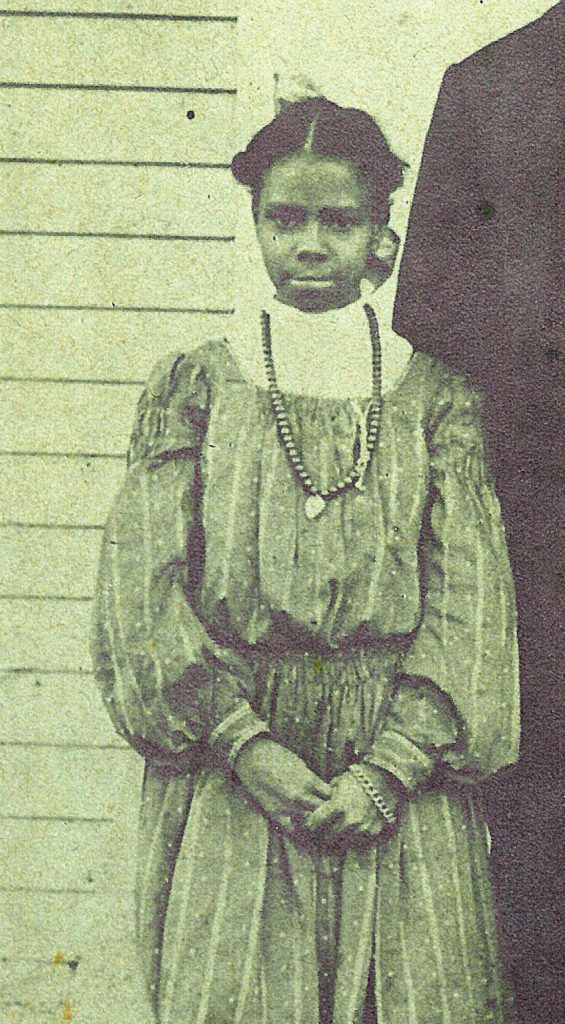
My grandmother, Leuendric Grayson (Wainer) Gonsalves (1889 – 1987) was the taskmaster, educator and matriarch. She believed in “spare the rod, spoil the child.” She graduated from high school in 1902 and 5 of her 7 children also completed high school. The Wainers believed in education and if you ever came to the Wainer farm during the summer, you would find Nana holding classes on the hill under the apple trees on your subjects for the next school year.
Nanna had no sense of humor especially where church was concerned. You wore your Sunday best and your shoes were spit shined. She would have the kids sit on each side of her within arm length. The bad kids sat next to her so that she didn’t have far to reach to get their attention. If you turned around to see who was coming in late you received a good cuff to the back of the head. If you were fidgeting or acting up you got your ear boxed or got pinched. You were in big, big, big trouble if you made Nanna take you outside before church services were over. You had to walk all the way to the back of the church and everyone knew what was in store. If you wanted to see someone possessed, make Nanna get up from her pew in front of the congregation to discipline one of her kids. The best way to get through the long Sunday sessions was to be quiet and go to sleep. There was no playing, movies or games on Sunday.
The Only Kid
Being that I was one of the youngest at the farm, I inherited the position of being the only kid at one time at the farm. Bruce and Steve were older and gone on to do different thing. After my chores were done I would go off hunting or exploring in the woods. This training prepared me for life where I don’t feel that I need to be with or entertained by someone. I can travel up and down the highway and by ways staying in strange locations and not feel lonely. The umbilical cord stretched a long way and knowing I could always go home gave me the courage to go where one thought was not possible.
2. Blueberries
When blueberries were in season, Toi Toi would go out early in the morning, after he had done his chores and do some serious picking. It was nothing for him to pick in a matter of an hour 10 quarts of berries. He didn’t take us kids out, that was left up to GaGa. He would be like the pied piper leading us into the wood to pick berries. The rule from Nana was that if you didn’t return home with your little pail full of berries you did not get any blueberry dumpling. The lazy kids were always helped out from GaGa’s pail. He would place us by a tree that was loaded with berries and then go off to pick on his own. We would fill our pails and bellies and then he would return and lead us home. Throughout the spring and summer, we had some kind of berries to pick and eat.
3. The Animals
Chicken chaser
I remember being three or four and liking to chase after the chickens, trying to catch them. I was constantly being told not to but it was too much fun to stop. One day I chased the big rooster and having fun chasing him around the house and down around the haystack and into the barnyard. After a while I lost interest and started to walk back to the house. I heard footsteps behind me and turned around to see what was there and here was that old rooster running up behind me. He now had gone on the offence and was ready to do battle. I tried to run but he would hit me on the back of my legs and sandals with his spurs and, when I turned to kick at him, he fought right back. Finally, my yelling and screaming was heard and my older cousins came running and chased him away. He was made into stew before the day was over.
The Geese
ToiToi had these geese from China called Taluce that were the meanest things when they had babies or sitting on a nest. The geese had a large hump on their beak in front of the eyes. They were better than a guard dog. Nothing could approach the house or barn no matter the time of day that they would not sound the alarm.
I remember going down to the barn where a pair was setting on a nest. The female would lay an egg a day and cover them with down until she had enough to start sitting. Once she started sitting she would not leave the nest except for water. The male would relieve the female for a little while so that she could go for water, she didn’t eat, and then he would hang around a little while and then go away to feed. You could go near the nest when the female was on it because she would not leave it no matter what. The adults could go down near the nest even if the males were around, but because of their size the ganders would just fake an attack, make a lot of noise and then back off. They would attack everything else, the dogs or cats or even the cows and horses. One day I decided to go look at the nest by myself and didn’t know the gander was there. He saw me and I saw him and I took off but he was faster than me and grabbed my coattail with his beak and held on while he beat me with his wings. I couldn’t get away because of his size and after a couple of whacks from his wings he let me go and I took off like a flash. From then on, I checked to make sure the ganders weren’t around or went with an adult.
Even though Nanna wasn’t much bigger than we were, none of the animals messed with her, I guess they could tell from the way she acted and the way she beat us kids, their lives would be on the line. If she was walking down the lane and a snake was sunning his self in the path, Nanna would turn around and go get a hoe or stick and if he was still there he was a dead snake. Her thinking was that the snake had no business being in her path and if he saw her and didn’t leave he didn’t deserve to live. She killed more snakes than anyone I know. The snake was OK if he was in the field or using the lane to go somewhere, but if he was just hanging out it was his last day on this earth. Every time I see the fat chick in the BC comic strip beating up on that snake it reminds me of Nanna.
Babe/ Nellie/ Brownie/ Red
I was not born when ToiToi bought Babe. She was a large gray Perch draft horse of about 2000 pounds. She was a one-man horse and ToiToi was the only one that could handle her. She looked like the Lone Ranger’s horse Silver. When we were babies we would get to ride on her on the way to and from the field. We were taught as babies to walk between her legs and under her belly so we would be comfortable around her. When we got bigger my cousins and I once threw sticks at her just to see her run with her mane and tail flowing. Then, when I had to go in her stall to feed her, I would be afraid that she would remember what I had done and stomp me to death.
I used to harness Nellie by myself when I was about 8 or 9. Nellie was a large draft horse that weighed about 17 or 18 hundred pounds. When she was harnessed and hitched to the wagon she wanted to go and would not stand still. My job was to stand in front of her as ToiToi, Bruce and Steve loaded the wood onto the wagon. I was scared to death standing in front of almost a ton of horseflesh that wanted to run over me. Once Nellie worked up a sweat she would become as calm as a baby. Like Babe she would not step on or hurt you.
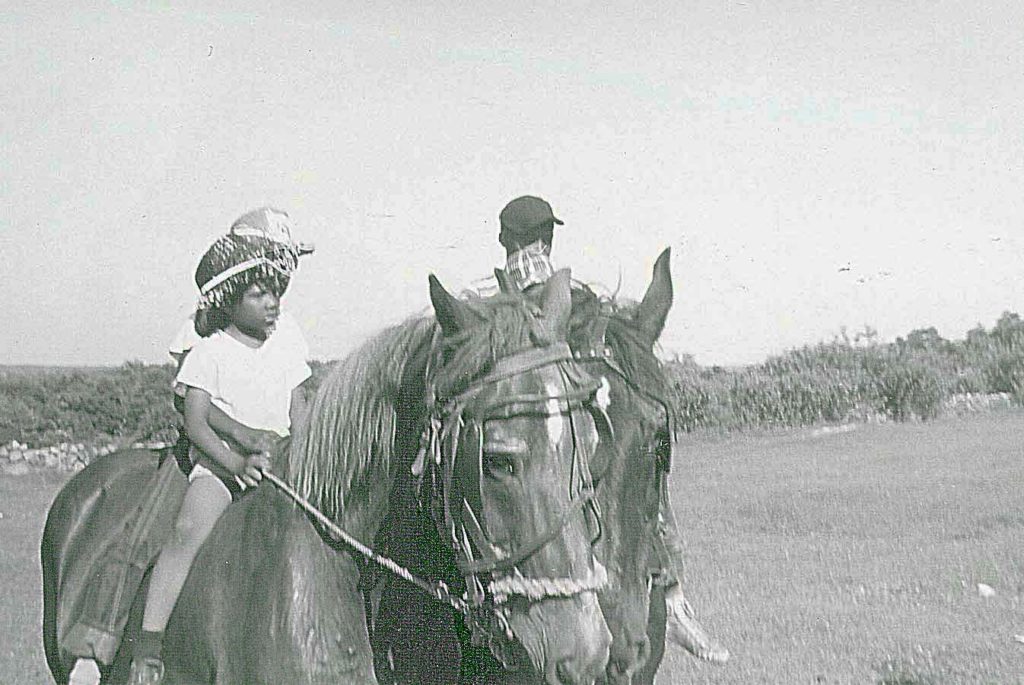
Riding Brownie and Nellie
I was taught to ride Indian style, bare back, using your legs and hands and holding on to the mane. When I would go out to the field to get the horses, if I could get one over near a rock I would jump on and ride them back to the barn, it was better than walking. If they saw you coming out with a halter or bridle you would have to chase them all over, they knew that this meant work. If you tucked a rope behind your back or went out with nothing, you could walk right up to them.
I used to be one of the stompers who got to ride on the top of the hay wagon stomping down the hay as it was thrown up. When the wagon was full we could be 12 to 14 feet off the ground. We were so high and there was so much hay that you could just about see Nellie. If you got too close to the edge you would just slide off onto the ground and probably get hurt. The load would tip back and forth as ToiToi drove the wagon up to the haystack across from the barn to be off loaded. The haystack grew to as high as anyone could reach up to hand the hay to the person on top to stack it about 20’. Once more we got to walk on the hay to pack it down.
ToiToi bought a horse called Brownie and I worked him on light work such as harrowing, raking or hauling light wagon loads. Harrowing was a dangerous operation. You were balanced on a seat above the harrow discs while being bounced around on the plowed farrows. One could be easily bounced off and end up under the disc with serious injuries. Brownie was one smart horse. We had to leave a narrow spot in the gate for Uncle Ed to get through. Because of his stroke, he could not lower the bars. Brownie watched and saw how Uncle Ed got out of the house lot and he would sneak through the same spot. We had to watch him and finally saw him doing his magic act of getting out of a closed lot. He also would put his head over the top bar on the gate and hook his jaw under the rail and lift and slide the rail until it would fall and then he would step over the lower bars. Everyone would look at one another trying to figure out who left the gate open until we caught him in the act. We had to resort to placing a heavier rail on the top bar.
Red was a big red horse that liked to run and scare the little kids so he wouldn’t have to work. He wasn’t mean, he just thought it was a fun thing to do. He belonged to the Pires family but I would ride him because of his attitude. He liked to take the bit in his teeth and then you would not have control. He then would either rear up on his hind legs or run flat out. The problem with rearing up is that if he lost his balance he could fall over and you could be injured or killed. It would have been different if he had been like the Lone Rangers horse Silver who did it all the time and knew what he was doing and did not lose his balance. The trick with riding Red was to change his bit frequently, work him often and hang on until was winded and then he would act like a normal horse.
I was taught to ride Indian style, bare back, using your legs and hands and holding on to the mane. When I would go out to the field to get the horses, if I could get one over near a rock I would jump on and ride them back to the barn, it was better than walking. If they saw you coming out with a halter or bridle you would have to chase them all over, they knew that this meant work. If you tucked a rope behind your back or went out with nothing, you could walk right up to them.
The Dogs
We always had dogs at the farm. I grew up with Zippy, Skippy and Brownie. Brownie was a big mean dog who was always chained up at the entry to the Hill. He was supposed to be a Russian Wolfhound and he used to toss the chain, the type we would use to log with, around like it weighed nothing. When he broke loose we would all run to the house until ToiToi or GaGa tied him back up.
Skippy was a Cocker Spaniel who loved to chase balls. He would chase after a ball you threw all day. When he got tired he would sit down with the ball at a distance from you until he caught his breath and then he would bring you the ball to throw again. When there wasn’t a ball he would bring you a stone.
Zippy was the best dog ever. She was around before I was born and Mom and Dad had to have her put to sleep when LuLu and I were away at school. She lived to be 21 years old which is hard to believe but I know for a fact that she was around all the time I was growing up at the farm. When she was babysitting us kids no one but family could come near us even the other dogs had to stay away. When we would play and roll on her even if we hurt her she would just get up and move away a little. Mom and Dad would come out to the farm once or twice from the city during the week and usually Saturday and Sunday. As Zippy got older she developed ESP because she would go lay in the lane next to the barn about an hour before they came. She would only do this on the day they were coming. We would watch her and know whether they were coming or not. Sometimes she would go and lie in the lane and then after a while get up and leave. Mom would not come that night. When they did come we would ask if they had planned to come the day before and Mom would say yes but something had come up and they had changed plans. I was angry for a while after Mom said that they had to put Zippy to sleep but it was for the best because she lost control of her hind end and had to drag herself around. I’m glad they had the courage to do it because she had lived an extraordinarily long life and did not need to suffer.
4. Driving
I learned to operate the farm tractor at age 12. I had been watching adults and my older cousins, Bruce and Steve, and the only reason I couldn’t drive the old model T’s was because my feet couldn’t reach the pedals. Before the tractor, we had a couple of old mail trucks. One had the chassis cut down to make it more maneuverable in the fields. The other one was left with the standard chassis. They were only good on firm surfaces. They would get stuck in the fields and ToiToi would have to get Babe or Nellie to pull them out.
I knew the gear shift pattern and the speeds by heart. I remember one time we were coming down from the wood lots in back and the coil wire would bounce out whenever we hit a bump, Bruce or Steve was driving, the engine would quit. They talked me into standing on the running board and holding the wire into the distributor. Well, it worked fine until we hit another bump. The coil wire ended up in my hand and 100,000 volts went through me. I got real smart then and no one could get me to do that again.
GaGa died before I could show him I could drive the tractor, he thought that I was too small.
The experience of driving on the farm made me a better driver on the streets. When you are operating the farm equipment you have to have your head on swivels making sure you know what’s happening around you. When you plowed in the small lots surrounded by stone walls that we had, you had to know where the walls and big stones were in order not to run into them. Our tractor didn’t have power steering so when the tricycle front end would hit a stone the steering wheel would spin out of your grip. If you had your thumbs inside the wheel spokes you had a broken thumb. You had to look beyond your immediate position and anticipate what could happen. Now when I’m driving I look as far down the road as I can see and all around me to anticipate what someone else may do and what my options are. I’ve avoided major wrecks simply because I was prepared. I react instinctively to situations that if I had to think about would be fatal.
When I read about Paul Cuffe and his nephews, it reminds me of what ToiToi taught me. I was working with animals and machinery since I was old enough to do it and I left the farm with all my limbs. There was a daily opportunity to be seriously injured or killed. Farming has one of the highest amounts of injuries and fatalities of any occupation. I was taught even though I might take longer, to do it safely.
ToiToi would tell me to plow slower in a low gear. Every time I would plow in a higher gear to get it finished faster I would spend the time I thought I would save plus fixing the plow. At the lower speed the plow would have hung up or bounced around the rock instead of breaking. When this happened ToiToi didn’t come running out to help you, he would come out to make sure you were alright and you were left to repair the damage.
5. Mom the Great Organizer
Momma would organize mystery rides that would start at Bethel AME church on Kempton St and travel through Dartmouth and Westport and end up at the farm for a picnic.
There were always church outings especially when there were convention gatherings because this was the only place large enough to entertain that size crowd. There is a photo of one such gathering in the ‘20’s pertaining to an AME convention.
Every weekend there was a family get together at the farm. Relatives and friend would visit from as far away as New York would come to the farm at least once a summer. It was nothing to have 30 or more people gathering. The 4thof July was a big time where we could have more than 15 or 20 carloads of adults and children visiting. It was free Lincoln Park with food, games and open space for the city kids to run and yell till their hearts content and then usually the New York or Boston crowd would have some fireworks that we would light off in one of the fields. After that we could go to Lincoln Park and watch the real deal fireworks show. Labor Day was another big day in The Country. This would be the time that the kids would have one last fling before going back to school. Also going to Lincoln Park would slow down after this date.
6. Baseball
We had a field set up to play baseball on. We would sometimes have a game against the adults. As we got bigger, we could hit the ball over the wall into the hay field and lose the ball. So, a ruling was made that anything hit over the wall was not a home run, but one or two outs according to the size of the kid. This could mean the difference of playing more or the games over as to whether we found the ball. The same thing went about learning not to hit the ball on the trademark of the bat. If you broke the bat, you caught heck from everyone and the game was over unless we had another bat or some tape.
The games would end abruptly when chores had to be done. Such as watering the cows and horses and milking the goats. Wood had to be brought in at night for the fire in the morning. There were three baskets, one for kindling for starting the fire, one for small pieces to get a hot fire, and one for large pieces that would keep the fire going. Water also had to be brought in from the well that evening. All the kids had their assignments according to size as to what they were able to do. And Lord help us if, when Nanna got up in the morning and things weren’t ready for her to prepare breakfast, the whipping would start early.
7. The Gardens
There was Toi Toi’s garden, “The Main Garden”. Then there were gardens for whoever else wanted to try their hand. From the time that plants started sprouting until the first snow we never purchased any vegetables. Everything came from the garden and we had so much that we would give away bushels to anyone who came to the country. We stored potatoes, onion, garlic, and carrots to be eaten all winter.
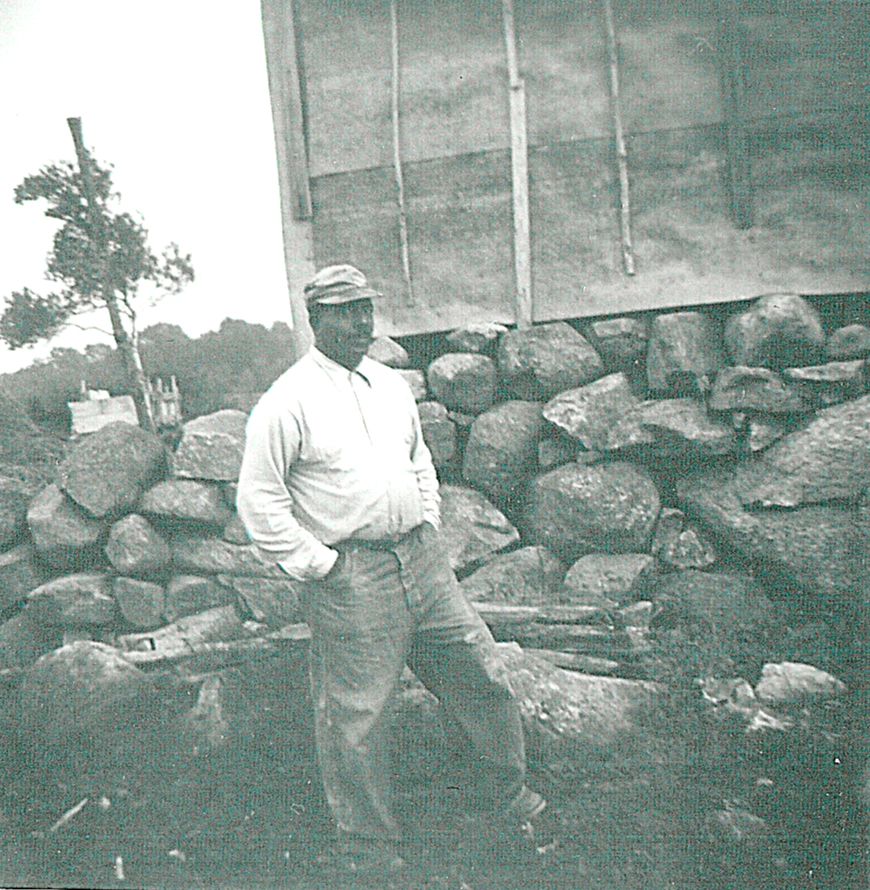
Antone Gonsalves Jr. (Toi Toi)
My Uncle Antone Gonsalves Jr. (Toi Toi) was my teacher on the farm. From milking cows and goats, to felling trees, to harnessing the workhorses. By the age of 8, I could go to the barn and harness whichever horse was needed for whichever task was by myself. He taught me so well that I never got hurt and have all my fingers and toes.
8. Springtime
Eating off the land. Before the greens were ready from the garden Nanna would harvest lamb’s quarters, milkweed, dandelion greens, wild mushrooms and skunk cabbage. We never had to worry about going hungry. There were plenty of eggs, milk (cow + goat), butter, cheese, chicken, rabbits, ducks and geese. We used to take baby rabbits from their nests during haying time and raise them by feeding them goat’s milk with an eyedropper.
9. The Elders
Nanna was the head of the family as far as taking care of the kids. The adults were out working and Nanna and GaGa watched the children. After looking at the family history and seeing the number of mariners in the family I now understand. On board ship, the lack of responding instantly to an order could mean the difference between life and death. Well, Nanna applied the same structure to us kid. She could not understand that your priority did not relate to hers. When she told you to do something she didn’t understand that you were going to do it but you wanted to contemplate the situation or maybe finish what you thought was more important. I never remember Nanna being more than arm’s length from a switch. I think she stashed them at strategic locations and the size of the switch grew in size as we did. When she gave an order, you had to be moving within a nano-second or else you would feel the sting on your bare legs (only grown men wore long pants) of her switch. Even though she was all of 4’ 11” and all of us towered over her by the time we were 10 years old, she ruled.
When she walked down Kempton Street to Bethel AME on Sunday or any day, grown men would go inside rather than have to explain why they weren’t working instead of holding up the lamp post or hanging out in front of the rum shop. Momma and ToiToi resorted to lectures more often than whipping and most of the time you would rather get a whipping than to stand there and get a talking to.
If you wanted to kick back and take it easy you hung out with GaGa. GaGa would take us down to his garden and we would sit on the ground or a stone at his feet and he would take out his knife and peel and slice us some fruit or cut one of his melons in pieces and feed us like little birds. He would also help us with our chores when we were in trouble with Nanna.
Uncle Ed was Nanna’s brother who had had a stroke and was paralyzed on the left side. He had been the manager on the Tripp’s farm, two farms over, and as the story was told was given the farm when the Tripps’ died. He fell in love, sold the farm, got married and moved to Baltimore. After his stroke he had no place to go so Nanna took him in.
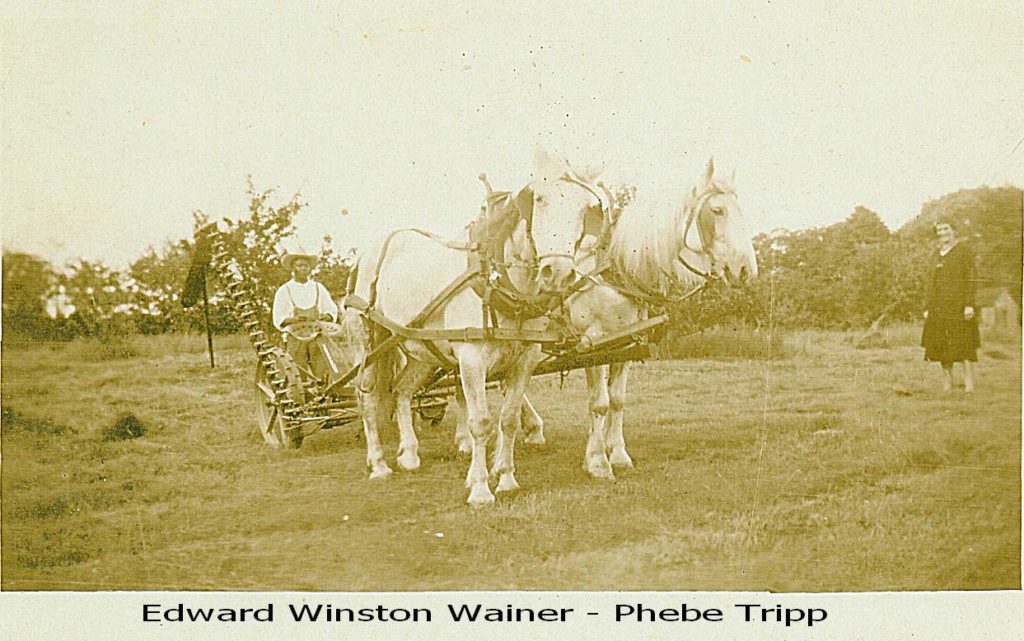
Edward Winston Wainer (Uncle Ed) and Phebe Tripp
Uncle Ed was Nanna’s brother who had had a stroke and was paralyzed on the left side. He had been the manager on the Tripp’s farm, two farms over, and as the story was told was given the farm when the Tripps’ died. He fell in love, sold the farm, got married and moved to Baltimore. After his stroke he had no place to go so Nanna took him in.
Cousin Walter was Paul Cuffe’s nephew and lived down on the riverside of Drift Road on the property then owned by Cooper Gaw and now David Lane. When the property was sold he asked ToiToi if he could live on the farm and took one of the sheds and converted it into his house. I used to ride Brownie down to the Roberts’ once or twice a week to get Cousin Walters’s mail. He would get tons of magazines and books and would have every nook and cranny in his house stacked with them. He practiced his own home style of medicine after collecting herbs and roots. When ToiToi killed a skunk around the barn, cousin Walter would take it and use the fat for his potont. He lived on his own to be close to 100 years old.
Mr. Roberts (old Man) & his son John Roberts brought the property of Michael Wainer Sr., on the riverside on Drift Rd. We were raised that you did not call an adult by his first name no matter how familiar you were. It was always Mr., Mrs., Miss, Cousin, Uncle, or Aunt so even though I was in my twenties I still referred to them with what we were taught was respect. ToiToi was Uncle Toi or ToiToi. I would go to the big house, which used to be Michael Wainer’s, to get Cousin Walter’s mail from Mr. Roberts Sr. The big wide floorboard would creak and there was a huge honey beehive on the north corner of the house. I think it was so large that it sagged part of the wall. It was a two-story house and Mr. Roberts lived in a couple of rooms on the second floor. I would go up the flight of stairs to where Mr. Roberts would give me the mail and if I could not get Brownie to stand by a rock so I could get on his back, I would have to walk back up the lane, leading him by the bridle.
I remember Mr. Arthur Blair as the man with the bowed legs. We were told that he was a horse trainer. He was the one that named me Chicken Chaser because of my tendency as a toddler of running after the chickens.
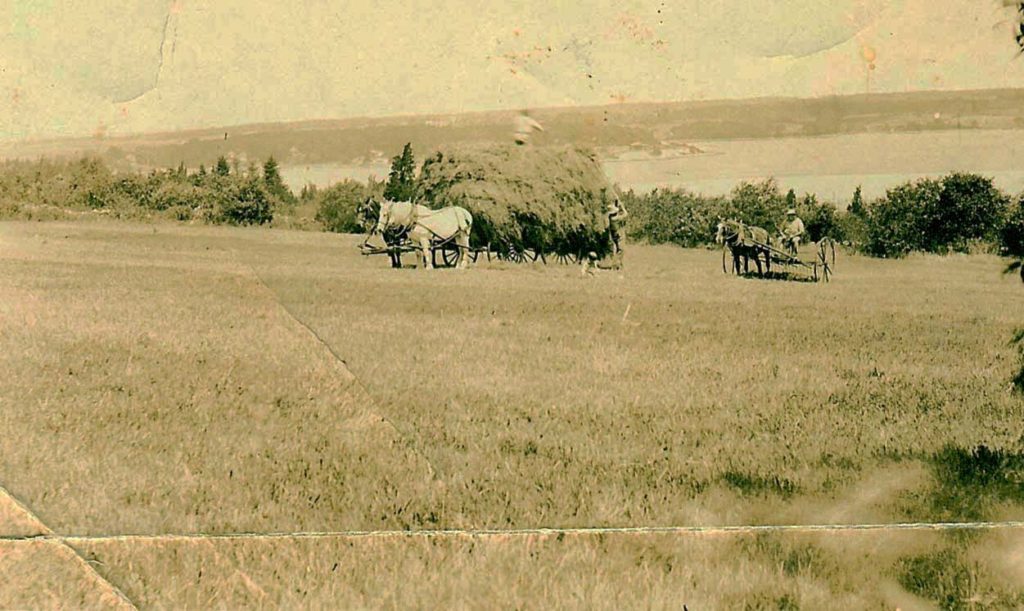
Haying at Cooper Gaw’s property on Drift Road
I used to be one of the stompers who got to ride on the top of the hay wagon stomping down the hay as it was thrown up. When the wagon was full we could be 12 to 14 feet off the ground. We were so high and there was so much hay that you could just about see Nellie. If you got too close to the edge you would just slide off onto the ground and probably get hurt. The load would tip back and forth as ToiToi drove the wagon up to the haystack across from the barn to be off loaded. The haystack grew to as high as anyone could reach up to hand the hay to the person on top to stack it about 20’. Once more we got to walk on the hay to pack it down.
10. Up on the Hill
We would eat outside on the picnic tables under the apple trees on the hill during the summer. This was where everyone relaxed. Every day we would put the cushion on the lounge chairs and put away every night. There was always a cool breeze under the apple trees and you could see down the lane when anyone came.
If you spent the summer in The Country, you had your schoolwork for the coming year every morning after chores and breakfast until lunch. You did reading, writing, and arithmetic. Nanna, having graduated from high school, not an easy feat in those days, was serious about schooling and you were not allowed to live in her house unless you were going to school. You were going to school until you were 21 if that was how long it took to graduate from high school. She was proud of the fact that, of her 7 children, 5 graduated from high school and none of them ever brought disgrace to the family name.
11. GaGa’s Medicine
GaGa would walk through the woods and pick his herbs and roots. He would give us a leaf of slippery Elm, which was a cheap form of gum and gave your mouth a slippery feeling. He would use the sassafras roots to steep in a form of a tea and mix his other herbs with it. My cousin Barry would have severe attacks of asthma and when he would stay in the country after playing all day would almost suffocate. GaGa would steep his tea and Barry would sip it and his attacks would be relieved. There was no hospital to rush to so GaGa was our medicine man. GaGa’s herb bags hung up to dry in the kitchen I’m just sorry I was not old enough to record his talent. He was a man who was born in the Cape Verde Islands, came to this country as a cabin boy on a whaler, and didn’t know how to read or write English but knew his plants. There are plants that will make you seriously ill or even die so you had better know what you are doing. How he knew is a gift that you are born with.
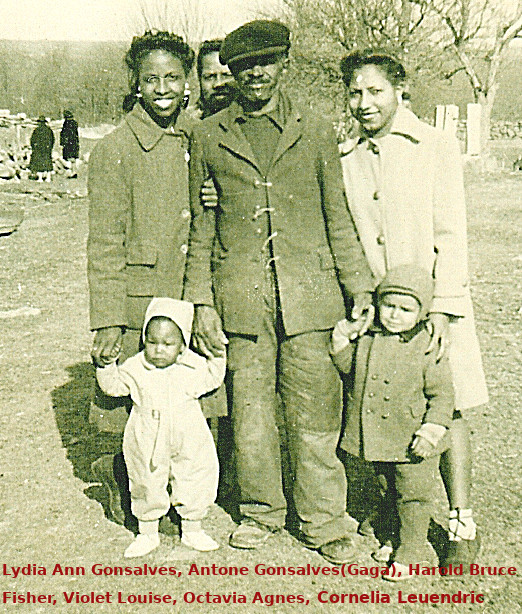
Antone Gonsalves (GaGa) with his daughters, the Gonsalves sisters.
My hero was my grandfather, Antone Gonsalves (1877- 1960). He came to this country as a cabin boy on a whaler from the Cape Verde’s. He was the kindest, gentlest, smartest shaman I ever knew. He would go out into the meadows or woods and gather bark, berries, leaves and roots and dry them in paper bags. If you were sick he could make a potion or make a brew and it would help you to get better.
12. The Radio
GaGa talking to the radio
Nanna during her noon day chores listened to:
Our Miss Brooks
Our Gal Sunday
At night during snacks and games of Flinch we listened to:
The Lone Ranger
Sgt Preston
Gunsmoke
13. Mondays
Monday was laundry day and, if it rained, it would be the next sunny day. Everyone except the men did laundry. There were three tubs, one for washing with the scrub board; one was for bleaching whites and one for rinsing. Your wash was inspected by Nanna and if it was not to her liking it was washed over. All your clothes were ironed and patched and socks were darned if needed. We may not have had new clothes but they were clean and pressed, using the wood stove and heavy irons.
14. The Flag
Every morning, except if it rained, the flag was raised and taken down before dusk from in front of the house. It never was allowed to touch the ground and had to be folded in the military style to be put away in the drawer at night. In the spring the flagpole would be lowered to be painted.
15. The Wainer Stories
The word “can’t” was not allowed to be used in the family. It was always pointed out about the great seamen the Wainer’s. You can do anything if you put your mind to it. We were taught to have manners and say yes mam, no mam, please and thank you. We were constantly to look people straight in the eyes when you are talking to them and not at your feet and not to step off the sidewalk for no one. We were told that we had two strikes against us because of our color so we had to be ready when our turn at bat came up. The Golden Rule, “Do unto others as you would have them do unto you” was posted on the cupboard in the kitchen and it is probably still there. We were first class citizen of the United States of America and had fought and died in every war and we were to stand up for our rights. We were told these things so much that it became second nature and our actions were automatic.
One incident that bears this training out was when I made my first trip for Western Electric. I had accepted the job as an assistant engineer working on truck bodies. The first day I reported to work I was called into the boss’s office and was given a couple of thick textbooks on textiles and fabrics and told that the group needed an engineer to handle this product line and I was it. I started in June and my first field trip was to be in Sept. and south of the Mason Dixon no less. The guys in my group were joking, as I was making arrangements with the manufacturer, about them not knowing that I was black because of my New England accent. The kicker is I was handling fabric and going down to Henderson, NC Klan land. I laughed along with them because, one, I had been sheltered all my life and had been taught I was as good as the next man and did not think about what could happen and two, I had a job to do. Having been usually the smallest and youngest kid all through school I always had to try harder and had acquired what some would call an arrogant attitude. This was more of a way to challenge myself because if I was expected to be able to do it where was the excitement. I loved it when people thought that I couldn’t do it or it hadn’t been done before because it makes me rise to the occasion. Once I done it the excitement was gone and it becomes routine. Momma and ToiToi discovered this quirk about me early. Getting back to my story. I knew that I had a round trip ticket in my pocket and that if I didn’t like the reception I would take the next flight north. I was paged and met at the airport and taken to the Holiday Inn. You have to remember that this was 1969 and the war was raging and the north had gone through the riots. Most of the southern and some of the northern motels or hotels only allowed blacks to be servants and not guests. I checked in and we went to dinner — I living in Manhattan lights, paved streets, Broadway, Time Square — down some back road, over some mountain to some restaurant. We’re in a brown bag county so he stopped at a liquor store for a fifth of C&C. I didn’t drink because in Nanna’s house no alcohol or card playing was allowed. We had a steak and baked potato and when we finished he says let’s have another, he’s a big guy, and I said I couldn’t eat another so he orders a steak and splits it with me. He looks over and asks if I’m going to finish my potato jacket and when I say no, he throws it on his plate. On the way back to the motel, he had all but finished the C&C at the restaurant, he looks over at me and says “you don’t know where you are and you aren’t even scared.” I looked back and said “no, should I be” and he slaps me on the leg and laughs “you’re alright, I like you”. When I arrived back from the trip, my boss confessed because of all the kidding going on that he had afterthoughts about letting me go. I guess he would have kicked himself if I had not returned. I’m sure that I succeeded because of my attitude and upbringing.
Michael, Thomas and Gardner Wainer
I started looking into the Wainer side of the family because there is a lot of material written about Paul Cuffe but only some small mention of the Wainers. After reading some of the Cuffe books I came across mention of these three Wainers moving to New York. At first, I thought that they, being mariners, would have moved to the Long Island or down state area. With further research, I discovered that they had moved to the central area of upstate New York.
Michael had moved to Stockbridge, NY in 1812 and bought land that had been seceded to NY State by the Stockbridge Natives. He and his family lived there until 1860 when he sold the farm for about $4000. I think that he moved back to MA.
Gardner bought 50 acres of land in Scipio, NY just south of Auburn in 1812. He also bought 50 acres for his brother John, who was living in Westport at the time. He sold his land in 1823 and then acting for John and Mary sold their land in 1828. I read somewhere that he died in Syracuse but have not confirmed this fact.
Thomas was to have moved to Paris, NY just south of Utica in 1812 but I have not yet found any records with any reference to him in this area.
I found it hard to believe that they would give up the life on the high seas and move to central NY. This is quite a long way from their families and professions. I did more reading and realized that the War of 1812 had started and the US Ocean fleet that once numbered over 700 was taken off the ocean by the mighty British naval fleet. This shut down their ability to make a living so the next best and safest thing was to go into farming. Gardner followed the Quakers to the Auburn area. I think that Michael’s second wife was a Native from an area just south east of Stockbridge. In a letter Michael wrote to his uncle Paul Cuffe he said that Thomas is in Paris and to send any mail to him in care of Thomas Dean at the Clinton post office. Clinton is a town outside of Paris and I’ve found numerous indications that Thomas Dean lived in the area, but have yet to find a trace of Thomas.
16. The Farmhouses
There were two houses that burnt down because of fires in the chimney. No one lost their lives, but there was great loss of memorabilia. The two houses had been built around the well. I know that ToiToi took it seriously when the chimney caught on fire. You would hear the roar of the flames and could see the fire sometimes through the missing mortar. We would get ready to leave the house if it got out of the chimney. It would start if pine or other softwood was burned and tar would build-up on the walls of the chimney. If you had a hot fire the tar would ignite and the draft would get it cooking like a blast furnace. As I got older I would put up on the roof, because I was a lightweight, and drop and pull up a burlap bag with rocks in it to knock the tar from the chimney walls. Because of the past house fires, fires in the stoves were watched very closely especially at night.
The only house that I remember growing up in was the last house built near the hill. This house was not as fancy as the first two but stood through a great number of hurricanes and winter storms. We would all go to The Country whenever a hurricane was forecast because in the city there were the hazards of gas, electric and the big oak trees in the yard falling on the house. The hurricane winds would hit the old farmhouse and it kept standing. We would have our rain gear ready in case we had to leave and had been taught to go to the barn and if that was not available to hunker down next to the stone wall. We never had to resort to any of the options. The animals were let loose so they would not be trapped in the barn if it collapsed. They took shelter in the barn, but could leave on their own if anything happened. We would go out as the eye past over to harvest the apples and pears that had been blown down before the horses and cows got to them. It was fun because the ground was so saturated with water that the grass would act like a skating rink and you could run and slide around. We could never have had this fun in the city. ToiToi, GaGa and the bigger boys would secure anything that had come loose during the first blow and then we would get ready for the back end of the storm which was the most destructive for the trees because the root system was weakened from all the rain. In ’54 I watched the pear tree on the hill get blown down even though Nanna was yelling at us kids to get away from the windows.
17. The Graves
We as kids would be taken over to the grave site of Michael Wainer Sr. his wife Mary and one of their children. They are buried on what is now the Manchester farm. There were three grave depressions and three shale stones to mark the spot, which most likely have dissolved by now.
I had to go around with Nana (water boy) on Memorial Day when she would visit the ancestors and put flowers on their graves. John and his wife Mary and their three children are buried in Beech Grove Cemetery in Westport. Most of the other ancestors are buried in Rural and Oak Grove Cemeteries in NB.
18. The Stone
I don’t know why it was done but we were all shown the top stone on the wall at the entrance to the lower lot that had the date 1847 carved in it. The lane going to the house had stone walls lining it with tall stone entry posts for gates. Uncle Frank and friends to take to the crusher, when they needed fast money, had removed parts of the stone wall.
On days when I had nothing to do and I was the only kid around I would take the 22 rifle and go out from the house and pretend that the house was under siege and I had to sneak up on it from the other side of the farm. I would make sure that the dogs didn’t see me leave. I would go into the wood and use the stone walls as cover and circle around through the swamp and come up parallel to the house on the opposite side. I felt I was successful if the dog didn’t spot me until I came out into the clearing.
19. The Well
The well had coldest and freshest water around even in the middle of summer. Friends and relatives who visited would fill bottles to take back home with them. It was hand-dug; stone lined by the old Wainers and was about 100’ deep. When there were some long, hot, dry summers when everyone else’s wells were going dry and the brook started to dry up, the well never went dry. It was spring feed and the Wainers knew what they were doing when they picked that spot. Surprisingly it was not located on a low spot of the farm, as a matter of fact it is located half way between the swamp and the highest part of the farm. In the heat of the summer we would lower watermelons down in a pail to get them as cold as taking them out of a refrigerator.
20. The Ancestors
I always felt that I had ancestors looking down from the heavens after me. I thought it was GaGa but now I know it was also my mother, father, Wainer and other ancestors I don’t know about. I moved to Manhattan at the age of 21 by myself and lived at the YWCA at the corner of 32nd and 7thAve. This was a crazy time with Kennedy and Dr. King having been killed the previous year. Vietnam was still hot and heavy and the astronauts had landed on the moon. They were getting ready for Woodstock and it was the time of the flower children. I could have easily fallen in with the wrong crowd and gotten involved with drugs or been drafted, my lottery number was 47, and sent to Nam and never returned. Greenwich Village was within walking distance of where I was living. The drugs and women flowed freely at the parties, but my guardian angels would guide me the other way. I knew this guy who used to come to the parties who was supposed to be in rehab from horse (heroin) and about a year later we hear that he had ODed. He was a nice guy and seemed to have it under control. Every time it seems that I might have drifted down the wrong path, a hand would seem to reach down and redirect me.
I’ve had a few close calls which others didn’t walk away from. Like the time I was cutting trees in the back lots by myself and instead of notching them as I was taught, I looked at whichever way the tree was going to fall and cut it straight through and let fall. After dropping a couple of dozen trees, I had a few hangers and needed to drop a tree in the middle of the pile so that the others would fall. I mentally mapped out my escape route and went into the maze. I cut the key tree and as it was falling I threw the chainsaw down and started my retreat but tripped on a limb and fell as the mass of trees came down. Instead of being crushed to death, all that happened was a branch came by my head and knocked my rawhide hat off.
I had a ’70 AMX back in the days of the muscle cars. It was a 390 with a Holly quad, ¾ cam, tuned Hooker headers, a Borg Warner loaded 4 on the floor tranny and posi-traction rear end. It would do 60mph in second gear at 5000 rpm. I got up on route 88 behind the farm and with no one around as far as I could see cranked it up to about 120. I backed it on down because being an engineer I knew that at that speed the force on the tires multiply quickly and a blow out at that speed spelled disaster. I still had a lot more juice in the engine and could have easily pegged the speedometer at 160, but again my guardian angels told me to back it on down. I had proved to myself that it could go but, at that speed, the suspension was starting to float and you don’t have much control.
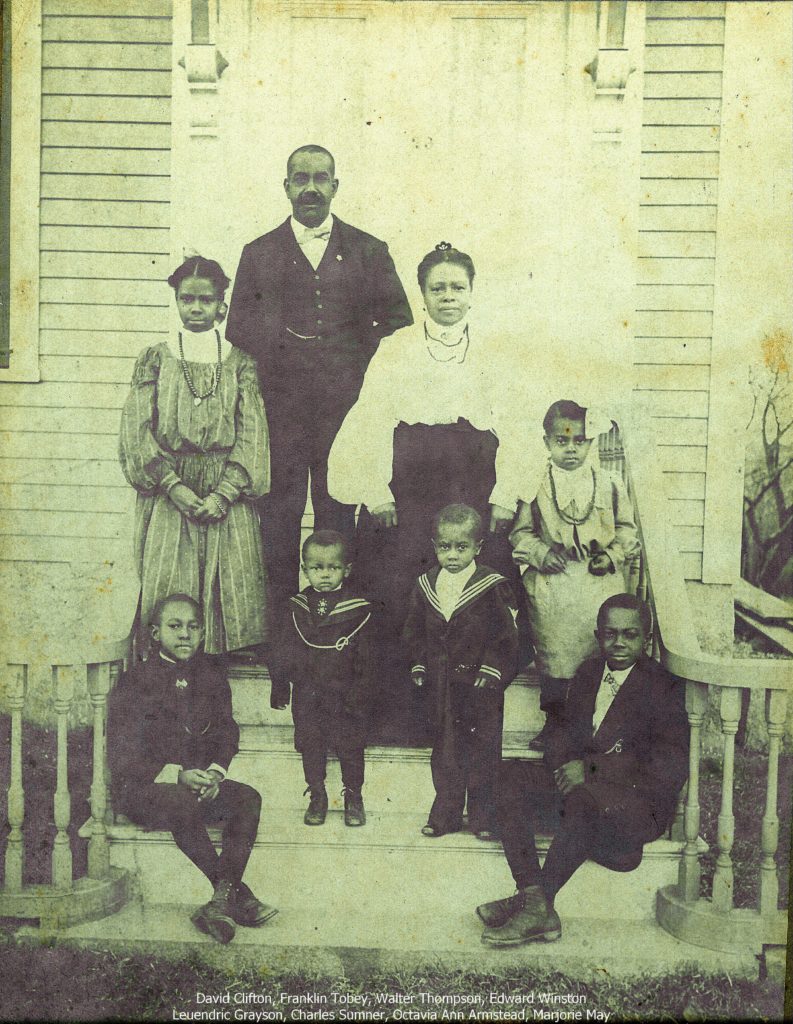
The Wainer Family: Front row: David Clifton Wainer, Franklin Tobey Wainer, Walter Thompson Wainer, Edward Winston Wainer. Back row: Leuendric Grayson Wainer (Nanna), Charles Sumner Wainer, Octavia Ann Armistead Wainer, Marjorie May Wainer. My family tree begins with Cuffe Slocum (1717-1772) my five-times-great-great-grandfather, Michael (Quaben) Wainer (1748-1815) my four-times great-great-grandfather and Paul Cuffe (1759-1817) my four-times-great-great-uncle). I’m one of a few people still living that walked across the floor in the Michael Wainer house that he and Paul Cuffe walked across.
Point Judith, RI to Nantucket, MA
The trip started on the day before the hurricane Agnes in ’72 prior to the Olympics in Mexico City. The day before a hurricane the sky is beautiful and clear with no hint on the pending storm and since we had made the commitment we decided to go even though there were small craft warning out. After a delay to fix a defective water pump on the engine we put to sea. Having a late start and having to tack we did not get very far. On one tack we had the mainsail tear free and had to lower it. We started the engine and headed into Newport, RI. We tied up to the dock and inquired about tying up to the state mooring and were told that there were some state buoys out at Goat Island. We tried the start the engine but found that the generator belt had come off and we had run in on the battery and it was dead. They allowed us to stay at the dock until the next day so that we could get a quick charge on the battery and proceed to Goat Island. By this time the hurricane front was starting to make its presence felt and cruising the area for a buoy was unsuccessful. We were able to get a berth at the Newport Yacht Club. I was being looked after by my ancestors because during the hurricane we saw photos of Goat Island where we would have anchored with 35’ cabin cruisers and other large boats broken and tossed up on the island like toys. We were in port for three days during the hurricane. We would go to the yacht club during the day and watch the Olympics and hunker down on the boat at night. The return trip to the Point Judith was uneventful. Little did I know that the Phelps had met their early death in these same waters.
Capt. Alvan Phelps, son-in-law of Paul Cuffe and a member of the Cuffe dynasty, commanded the Traveller on three occasions: twice as a merchantman and once as a whaler. Phelps’s two sons, John A. and Milton, aged seventeen and fifteen respectively, were crewmen on the May 1826 voyage to St Andrews, Canada. In 1822 Phelps took his son John on a whaling venture, to the Western Islands on the Traveller, as a member of an all-black crew of thirteen. The whaler was at sea less than a year and its early return may have been precipitated by a mishap on board that lead to the drowning of one crewman and the arrest of another. Captain Phelps and two of his sons were to meet personal misfortune themselves in 1831 when the Hamer on a coastal trip between Westport and Nantucket was wrecked and all three of them were lost.
About the Author
George Hugh Wortham Jr.
I was born on Nov 27, 1947, Thanksgiving Day, in New Bedford, MA to Cornelia Leuendric Gonsalves, (New Bedford, MA) and George Hugh Wortham, (Oroville, CA). I have four siblings, Jessye Leuendric Williams, Jesse Williams III, Harold Bruce Fisher, Jr. and Steven Edmund Gonsalves.
My family tree begins with Cuffe Slocum (1717-1772) my five-times-great-great-grandfather, Michael (Quaben) Wainer (1748-1815) my four-times great-great-grandfather and Paul Cuffe (1759-1817) my four-times-great-great-uncle). I’m one of a few people still living that walked across the floor in the Michael Wainer house that he and Paul Cuffe walked across.
I attended Thomas R. Rodman elementary, Keith Jr High and graduated from New Bedford Vocational High as a machinist in 1966. My first job as a machinist was with a company in Marion, MA called Braincon Corp where they made underwater instruments and equipment for the US Navy. I continued my education at Franklin Institute of Boston and graduated as a Mechanical Engineer in 1969.
After graduating I accepted a job as an engineer with Western Electric Co, the manufacturing arm of the Bell System, in Manhattan, NY. The office where I worked, (at 220 Church St), was about 10 blocks from the World Trade Center. I watch the completion of the first tower and the start of the second being built. I was on the street carrying a contract to the AT&T headquarters at 100 Broadway during the ticker tape parade for the Apollo Astronauts returning from the moon.
My job assignment was so critical to the national communication system that I received a deferment from the military draft.
After 5 years with the Bell System I took a job with 3M in St Paul, MN as an engineer in their telecommunication division. Three years later I asked for and accepted an area sales manager’s position in upstate NY. Little did I know, that when I settled in Syracuse, NY, the Wainer brothers had moved from MA to upstate NY around 1812, and had lived 30 miles west of me in Scipio and 30 miles east in Stockbridge.
I’m retired after 10 years in engineering and 28 years in sales, playing golf and working on the family history. I’ve been married to Carol Ann Johnson from Folkston, GA, since 1981 and have three children, Angela (Tony) Severn, MD, George III (Najla) Hanover, MD, Krystal, Atlanta, GA, and 5 grandchildren, Emani, Jaylla, Austin, Hayden, and Jordyn.
My hero was my grandfather, Antone Gonsalves, (1877- 1960). He came to this country as a cabin boy on a whaler from the Cape Verde’s. He was the kindest, gentlest, smartest shaman I ever knew. He would go out into the meadows or woods and gather bark, berries, leaves and roots and dry them in paper bags. If you were sick he could make a potion or make a brew and it would help you to get better.
My grandmother, Leuendric Grayson (Wainer) Gonsalves (Nana) (1889 – 1987) was the taskmaster, educator and matriarch. She believed in “spare the rod spoiled the child.” She graduated from high school in 1902 and 5 of her 7 children also completed high school. The Wainer’s believed in education and if you ever came to the Wainer farm during the summer, you would find Nana holding classes on the hill under the apple trees on your subjects for the next school year.
My Uncle Antone Gonsalves Jr. (Toi Toi) was my teacher on the farm. From milking cows and goats, to falling trees, to harnessing the workhorses. By the age of 8, I could go to the barn and harness whichever horse was needed for whichever task was by myself. He taught me so well that I never got hurt and have all my fingers and toes.
My goal has been to record as much of the family history as I can, from the written documents and from the oral tradition that I was fortunate to get firsthand and hand it down to the next generation. I hope that someday when we all get together, my grandfather, Michael Quaben and my uncle, Paul Cuffe will invite me to sit with them for a while and introduce me to the rest of the family and thank me for keeping their names in front of the family so that others in the family would know who they were.


